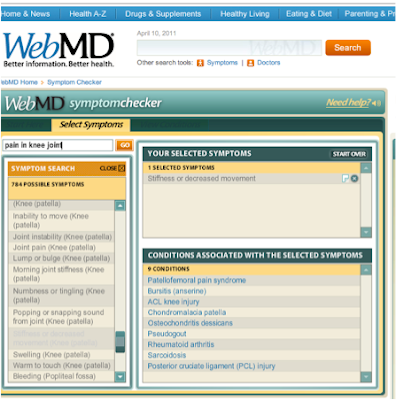Image from Symptom Checker
Oh my! One small pain in my knee, and a trip to WebDoctor later, and I could in fact have 9 potential illnesses! What on earth is chondromalacia patella? As discussed in Megan's blog, online symptom searching can be a dangerous phenomena, as what starts out as harmless curiosity can develop into a serious case of Cyberchondria...
Lewis (2006) explores this concept, analysing both positive and negative sides of the lay man having access to medical information online. While she acknowledges that people may self-diagnose with all kinds of irrational illnesses, she also explores potential benefits of accessing lifestyle/health information.
In today's MX [a newspaper, how ironic I know!] I read about an online course to educate participants about anxiety disorders. This resource is fully accredited by the Australian Government Department of Health, and provides a safe platform for users to anonymously seek information about a particularly stigmatising issue.
And I'd have to say, on this point I agree with Lewis. Online health advice can be empowering for the user, particularly if the individual would otherwise not seek any advice for fear or embarrassment of a face-to-face consultation. But, this online approach only works if mediated by accredited medical professionals...
References:
Australian Government Department of Health. 2011. "Anxiety Online". Accessed April 11, 2011. http://www.anxietyonline.org.au/
Lewis, Tanya. 2006. "Seeking health information on the internet: lifestyle choice or bad attack of cyberchondria?" Media, Culture & Society. 28 ( 4): 521-539.
Urban Dictionary. 2011. "Cyberchondriac". Accessed April 11, 2011. http://www.urbandictionary.com/define.php?term=cyberchondriac

No comments:
Post a Comment